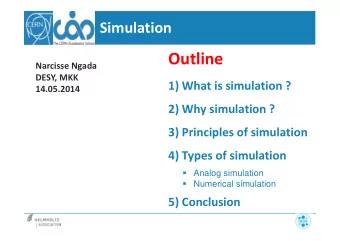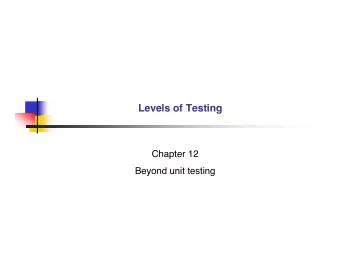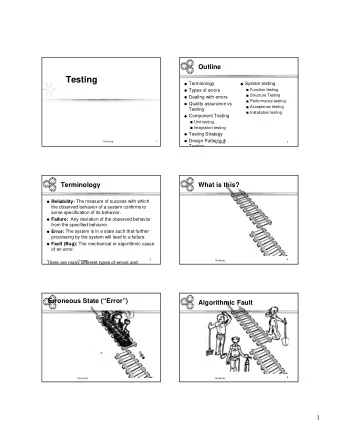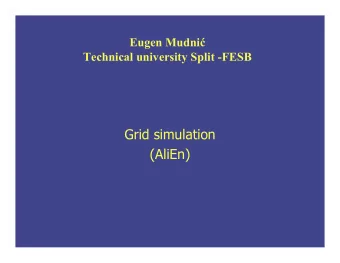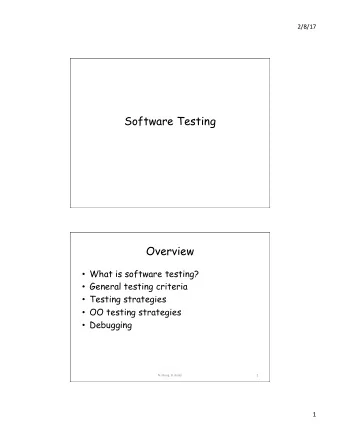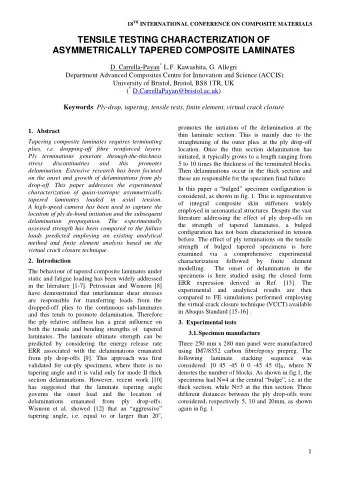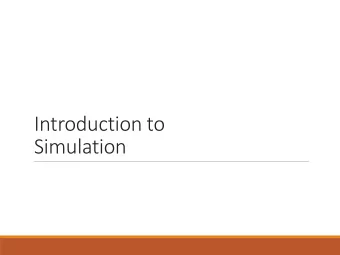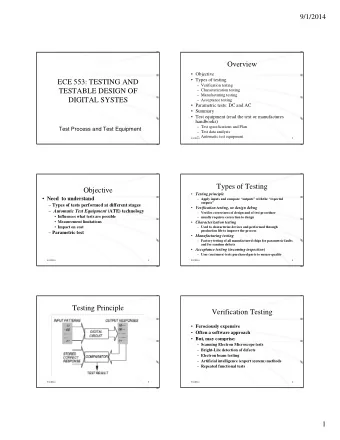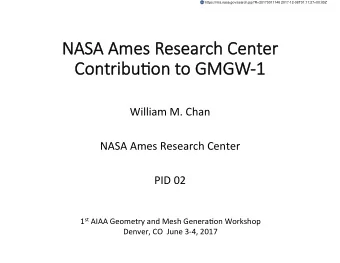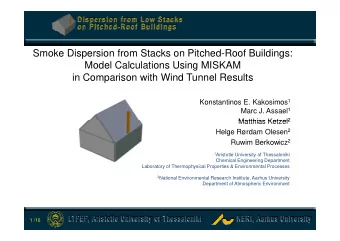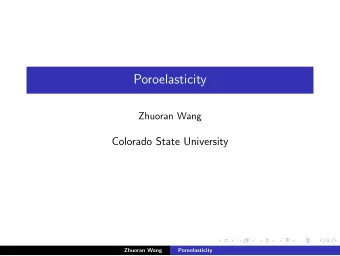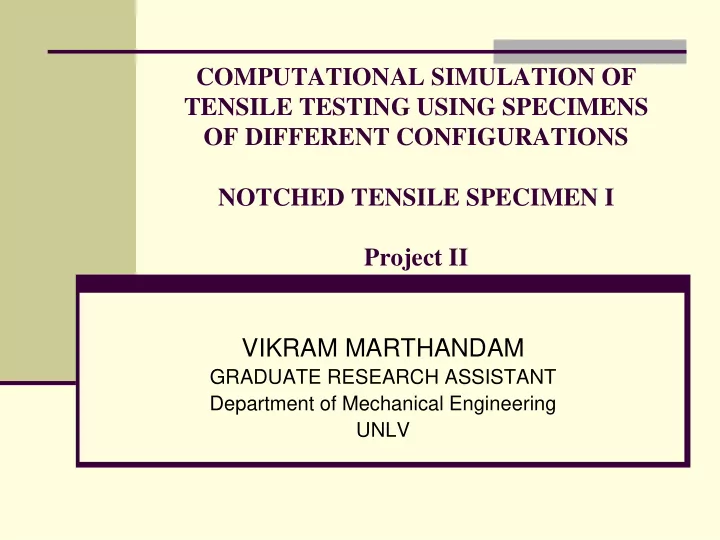
COMPUTATIONAL SIMULATION OF TENSILE TESTING USING SPECIMENS OF - PowerPoint PPT Presentation
COMPUTATIONAL SIMULATION OF TENSILE TESTING USING SPECIMENS OF DIFFERENT CONFIGURATIONS NOTCHED TENSILE SPECIMEN I Project II VIKRAM MARTHANDAM GRADUATE RESEARCH ASSISTANT Department of Mechanical Engineering UNLV OBJECTIVE To generate
COMPUTATIONAL SIMULATION OF TENSILE TESTING USING SPECIMENS OF DIFFERENT CONFIGURATIONS NOTCHED TENSILE SPECIMEN I Project II VIKRAM MARTHANDAM GRADUATE RESEARCH ASSISTANT Department of Mechanical Engineering UNLV
OBJECTIVE � To generate a computational model of a tensile specimen and evaluate its mechanical properties � To study the effect of a notch in the gage section of the tensile specimen � To study the effect of different mesh configurations � To plot the Stress VS Time and Strain VS Time � Compare the results obtained in both projects with experimental results. The constraints and boundary conditions were different from the ones used in Project I
MODELING � The specimen was modeled using Solid Works Educational Version � Total length of the specimen is 4 inches � The gage length of the specimen is 1 inch.
SPECIMEN CONFIGURATION (UN-NOTCHED)
SPECIMEN CONFIGURATION (NOTCHED)
SPECIMEN CONFIGURATION (SOLID WORKS MODEL)
SPECIMEN SECTION FOR ANALYSIS UN-NOTCHED NOTCHED
MATERIAL PROPERTIES MATERIAL DENSITY YIELD YOUNG’S (lb/in 3 ) STRESS (psi) MODULUS (E) (psi) 118 *10 3 3 *10 7 HT-9 0.283599 Element Type : 3D Solid 164 Material is Non Linear and Iso Tropic
MESHING � Two different meshing configurations were used � Mesh configuration 1 (coarse mesh) � Mesh configuration 2 (fine mesh)
MESH CONFIGURATION I WITH CONSTRAINTS (NOTCHED) U Z =0 in X-Direction, U y =0 in Y-Direction, U x =0 in Z-Direction
MAXIMUM STRESS CONTOUR (MESH I) NOTCHED SPECIMEN
STRESS/PLASTIC STRAIN VS TIME PLOTS
DISPLACEMENT VS TIME PLOT
MESH CONFIGURATION II WITH CONSTRAINTS (NOTCHED) U Z =0 in X-Direction, U y =0 in Y-Direction, U x =0 in Z-Direction
MAXIMUM STRESS CONTOUR (MESH II) NOTCHED SPECIMEN
STRESS/PLASTIC STRAIN VS TIME PLOTS
DISPLACEMENT VS TIME PLOT
MESH CONFIGURATION I WITH CONSTRAINTS (UN-NOTCHED) U Z =0 in X-Direction, U y =0 in Y-Direction, U x =0 in Z-Direction
MAXIMUM STRESS CONTOUR (MESH I) UN-NOTCHED SPECIMEN
STRESS/PLASTIC STRAIN VS TIME PLOTS
DISPLACEMENT VS TIME PLOT
MESH CONFIGURATION Ii WITH CONSTRAINTS (UN-NOTCHED) U Z =0 in X-Direction, U y =0 in Y-Direction, U x =0 in Z-Direction
MAXIMUM STRESS CONTOUR (MESH II) UN-NOTCHED SPECIMEN
STRESS/PLASTIC STRAIN VS TIME PLOTS
DISPLACEMENT VS TIME PLOT
COMPARISON OF EXPERIMENTAL AND COMPUTATIONAL RESULTS MESH EXPERIMENTAL COMPUTATIONAL RESULT CONFIGURATION SCHEME VALUES VALUES S PROJ I PROJ II MATERIAL Ult. Tensile Max. Stress Max Stress= Obtained HT-9 UN-NOTCHED SCHEME Strength= 143 118 Ksi = 184 Ksi 1 Ksi Max. Stress REFINED Ult. Tensile Max Obtained UN-NOTCHED MESH Strength= 143 Stress= = 188.5 Ksi Ksi 118 Ksi HT-9
MESH EXPERIMENTAL COMPUTATIONAL Results CONFIGURATION SCHEME VALUES VALUES Proj II Proj I MATERIAL Ult. Tensile Max. Stress Max Obtained HT-9 NOTCHED SCHEME Strength= 243 Stress= = 264.845 Ksi 118 Ksi 1 Ksi Max REFINED Ult. Tensile Max. Stress Stress= Obtained NOTCHED MESH Strength= 243 118 Ksi = 307.670 Ksi Ksi HT-9
CONCLUSIONS � The tensile specimen was studied under different mesh configurations � Comparison of computational and experimental results shows discrepancies in the magnitude of the parameter under consideration. � The results obtained were compared with those obtained in project I and also the experimental values. � Stress VS Time, Strain VS time and Displacement Vs Time were plotted.
Recommend
More recommend
Explore More Topics
Stay informed with curated content and fresh updates.
